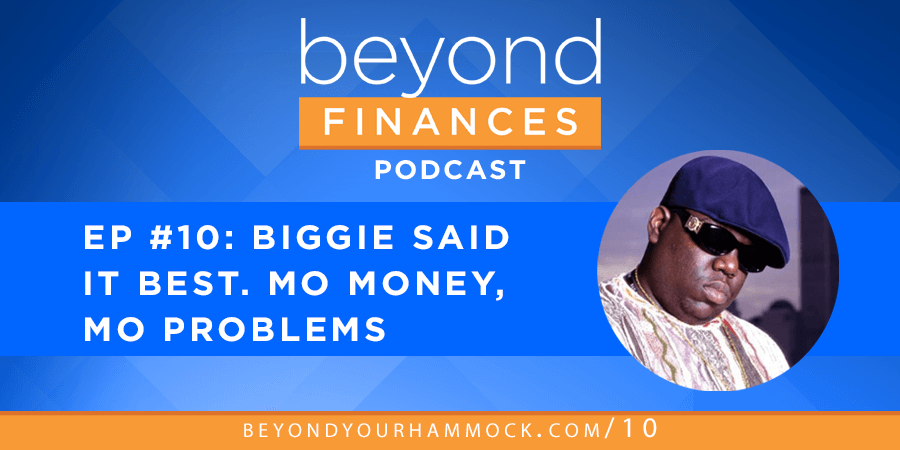You already know. Mo money, mo problems.
When you start making a significant amount of income, you’re probably going to be able to buy what you want at any given point in time. And that can pose a unique kind of problem.
Having that much choice and freedom, if you don’t manage it well or take responsibility for it, can lead to making bigger mistakes and financial decisions that you later regret.
Earning more actually makes it harder to manage your money in many ways, primarily because you have more and more choice as your income goes up and up. With less inherit restrictions or limitations to face, it becomes increasingly on you to be disciplined enough to focus on what matters.
In this episode, we’re walking you what to think about when you reach the point where you no longer have to ask “can I afford this?” The answer is probably yes — so now your challenge is optimizing where your money goes so you can get maximum happiness and satisfaction from it.
Jump into the episode here, or check out detailed show notes and takeaways below:
Our Favorite Shareable Moments & Takeaways
- When you’re starting off in your career, there’s a big focus on constantly asking “what can I afford?” When you have limited income, it’s important to ask that — but as you start making more, you need to bring more nuance to the question and consider what you want to afford.
- It’s nice to have more choice with your money — but the more choice you have, the more work/responsibility it takes to get your financial decisions right every single time. (Mo’ money, mo’ problems, anyone?)
- Earning more means it’s hard to make choices because there’s less inherit restrictions or limitations that you face. You have to be more disciplined to focus on what matters.
- Always be choosing. There’s a lot of choice in life, so you need top proactively look at things and intentionally decide what you want in your life.
- Life isn’t about only making the financially optimal decisions 100% of the time. You can’t live in a spreadsheet. You have to live your life along the way.
- You have to know how to prioritize things and get what you WANT, not just what you can afford. As Paula Pant says, you can afford anything… but not necessarily everything.
- Money gives you freedom, so it’s tempting to enjoy all that freedom right now… but consider that you’re probably gonna want to enjoy choice and freedom in the future, too. That’s the importance of saving/investing so you have wealth to leverage tomorrow (in addition to what you can enjoy today).
- Feel like you don’t have enough money? Look back at your spending from the last 30 days. Are you happy with where your money went? If not, then it might not be an issue of you can’t afford what you want… it’s that you’re not aligning your spending with your values.
- “Wasteful” spending is mindless spending; mindless activity or action. It’s wasteful when there’s no intention behind what you’re doing.
- We make 35,000 a DAY. That’s 12 million decisions a year. And the thing is, we suffer from decision fatigue. The more decisions we make, the more the quality of your decisions will decline. This could explain why smart, successful people still make stupid decisions with their money; they’ve exhausted their capacity for good decision-making for the day, so the money stuff doesn’t get the high-quality mental energy it deserves.
- You need someone to help check your blind spots. We don’t know what we don’t know.
- If, as a person who makes good money, you ask yourself, “can I afford this?” then the answer is probably going to be yes. The question that should follow that is “do I want to afford this?” The better choices that we make with the expensive things that we want, the more room and freedom we have to use our money in better ways that actually make us happy.
Further Reading & Resources Mentioned in the Show
- For more on not living inside a spreadsheet, check out Peter Lazaroff. (He has a new book out, too: Making Money Simple.)
- Go back and check out The Art of Making Intentional Decisions if you missed that episode
- Another great personal finance blog: Afford Anything by Paula Pant
- Seth Godin’s article on priorities around time and money
- Interested in more reading on how we think about money? Check out The Behavioral Investor by Daniel Crosby
Want More from the Podcast — and Your Hosts? Here’s How to Connect
We’d love to connect with you and continue the conversation!
Follow Eric @BeyondFinances on Twitter and Instagram
Follow Kali @KaliRoberge on Twitter and Instagram
If you have questions or comments, send us an email at team@beyondyourhammock.com.
You can even chat with Eric about becoming a financial planning client at BYH by clicking here.
And of course, we’d love to hear what you think. Share your feedback by leaving your review on iTunes. It means a lot.
